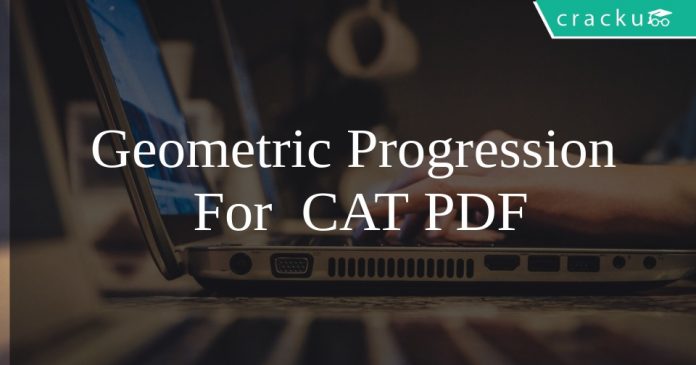Geometric Progression For CAT PDF:
Download Geometric Progression For CAT PDF. Practice important problems on Geometric Progression Questions with detailed explanations and solutions.
Download Geometric Progression For CAT PDF
Download All Quantitative Aptitude important Questions PDF
Question 1: If the first term of an infinite geometric progression is equal to twice the sum of terms that follow, then what is the ratio of the third term to the sixth term ?
a) 27 : 1
b) 1 : 27
c) 9 : 1
d) cannot be determined
Question 2: The sum of the first 24 terms of a Geometric series is equal to the sum of the first 26 terms of the same series. If the sum of the first 35 terms of the series is 92, then what is the third term of the series?
a) 65
b) 70
c) 92
d) 95
Question 3: If a is an arithmetic mean and b and c are two geometric means between any two
positive numbers, find the value of $\frac{b^3+c^3}{abc}$.
a) 0
b) 2
c) 5
d) 7
Question 4: Three numbers are in geometric progression and their sum equals 65. If the geometric mean is multiplied by 5 and the extremes are multiplied by 3, they form an arithmetic progression. Find the arithmetic mean of the AP so formed.
a) 75
b) 65
c) 86
d) 91
Question 5: In an infinite geometric progression with common ratio less than 1 the sum of any two consecutive terms is 8 times the sum of all the terms that follow them. What is the ratio of any term and the sum of all the terms that follow it?
a) 2
b) -2
c) -4
d) Cannot be determined
CAT Mocks for just Rs. 1180 – Last Day
Answers & Solutions:
1) Answer (A)
Let the first term of the infinite G.P be a and r the common ratio.
Given, a = 2(ar + ar$^2$ + ar$^3$ …..)
a = 2($\frac{ar}{1-r}$)
1 – r = 2r , thus r = 1/3
The ratio of the third term to the ratio of the sixth term = $\frac{ar^2}{ar^5} = \frac{27}{1}$
Thus, A is the right choice.
2) Answer (C)
Let the first term of the series be ‘a’ and the common ratio be ‘r’.
Sum of the first 24 terms = $\frac{a*r^{24} – 1}{r – 1}$
Sum of the first 26 terms = $\frac{a*r^{26} – 1}{r – 1}$
Since the two are equal, we have, $a*r^{24} = a*r^{26}$
=> $r^2 = 1$ => r = 1 or -1
Since the sum of 24 terms = Sum of 26 terms, r = -1 in this case.
So, sum of an even number of terms = 0
=> Sum of the first 34 terms = 0
=> 35th term = 92
=> Third term = 92
3) Answer (B)
Let x and y be two positive number.
a = (x+y)/2
x,b,c,y are in GP
Common ratio =$(y/x)^{1/3}$
b = x$(y/x)^{1/3}$
c = x$(y/x)^{2/3}$
$\frac{b^3+c^3}{abc} = \frac{2(x^3*y/x+x^3y^2/x^2)}{(x+y)x^2(y/x)} = 2$
4) Answer (A)
Let the three numbers be $a$, $ar$ and $ar^2$.
Hence, $a(1+r+r^2) = 65$
Also, $3a$, $5ar$ and $3ar^2$ are in AP.
So, $3a + 3 ar^2 = 10 ar$
But, from the above equation, $195 – 3ar = 10 ar$
Or, $13ar = 195$ and $ar = 15$
The arithmetic mean of the new AP is $5ar = 75$
5) Answer (D)
Let the terms of the GP be $a, ar, ar^2, ar^3, ….$
The sum of the first two terms = $a(1+r)$
The sum of all the following terms = $\frac{ar^2}{1-r}$
It is given that, $a(1+r)=8\times\frac{ar^2}{1-r}$
=> $1-r^2=8r^2$
=> $r=\frac{1}{3}or\frac{-1}{3}$.
The ratio of any term and the sum of all terms that follow is,
$\frac{a}{\frac{ar}{1-r}}=\frac{1-r}{r}$
The value of this is 2 or -4.
Hence the answer is Option D.





![CAT Averages Questions PDF [Important Questions] CAT AVERAGES Questions PDF](https://cracku.in/blog/wp-content/uploads/2022/07/CAT-AVERAGES-Questions-PDF-218x150.png)